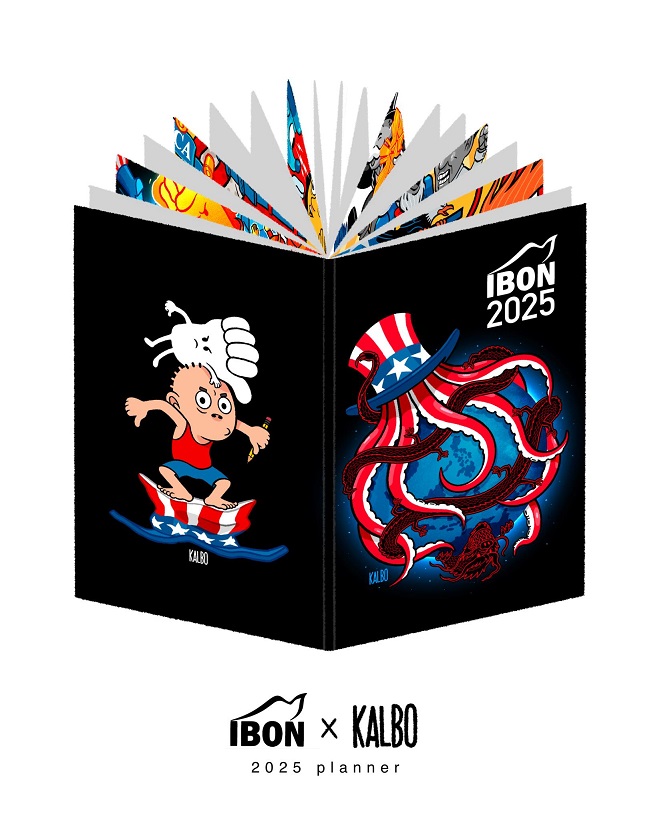The name Kevin Eric Raymundo doesn’t trigger automatic recognition in the way the alias Tarantadong Kalbo does. The alias is undeniably catchy, and intriguing, especially because tarantado is hardly a mainstay of polite conversation. It makes one wonder if the man, Tarantadong Kalbo, is simply a jerk (albeit a creative one) or a rebel with a cause (he’s the latter). The identification is shored up by his kalbo (bald) style that he wears with aplomb.
It’s Dec. 3 and Tarantadong Kalbo is at the office of IBON Foundation Inc. for the IBON 2025 Planner Launch and Signing event. Walking to the middle of the room after his introduction by event host Niña dela Cruz, he reintroduces himself, voicing over a video he has playing, then segues to announcing how the 2025 planner is different from this year’s.
He says he had less time completing the 2024 planner, but makes clear, in a mix of Filipino and English, that he didn’t wing it. He just wishes he had more time for it.
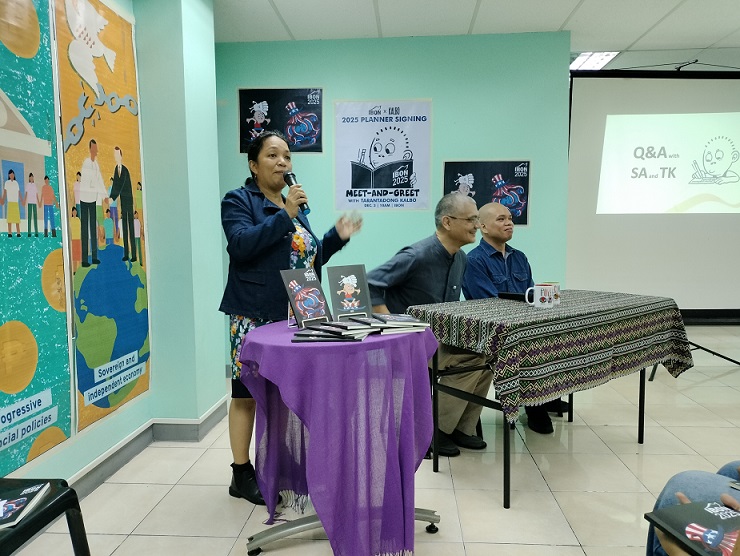
Joint effort
It was at a rally early this year when IBON offered Tarantadong Kalbo another collaboration, and, once on board, he completed the project in three months. He says the conceptualization was the demanding part of the process, necessitating intense research work and frequent discussions with the IBON Planner Committee.
Dela Cruz says an IBON planner is a tradition, and its past themes have included scarcity (2011), Bonifacio (2013), elections (2016), people economics (2017), and Tarantadong Kalbo’s Batang ‘90s scenes, Slice of Life, and political commentaries (2024). For 2025, the theme is imperialism.
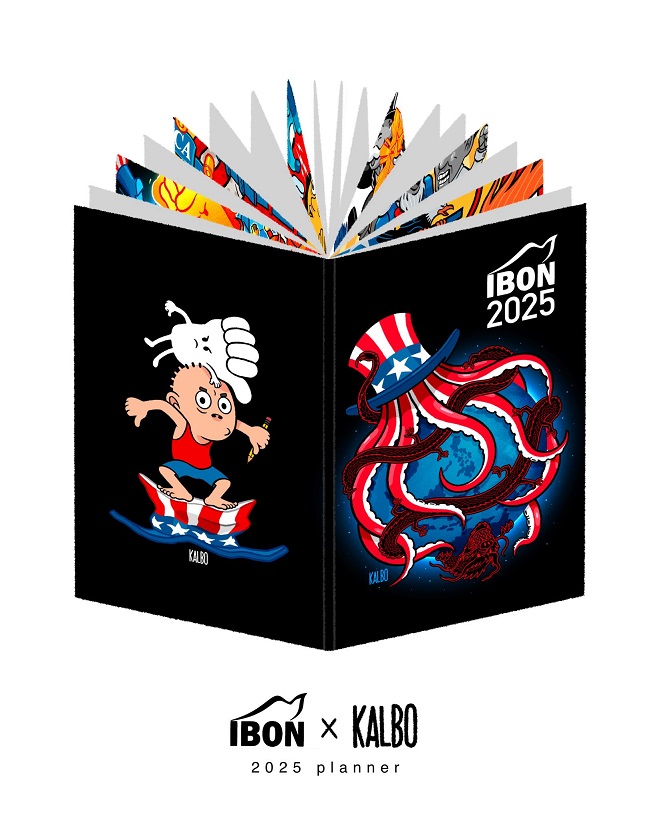
IBON and Tarantadong Kalbo’s collaboration isn’t surprising because they’re on the same ideological plane vis-à-vis Filipinos’ ongoing fight for truth and justice. One engages Filipinos through words, and the other does it through art. Before making the planners, Tarantadong Kalbo deconstructed the horizontal fist gesture of former president Rodrigo Duterte, turning it into a standing fist figure — “Tumindig,” with a new message: to stand up by voting in the 2022 presidential election. “Tumindig” catapulted the artist to meteoric Internet success, but also opened him to unrelenting trolling and death threats.
Says Tarantadong Kalbo: “‘Tumindig’ is the best and worst experience. It came to a point that Attorney Chel Diokno reached out to me, [offering assistance].”
Nonetheless, the unsettling situation made him “sharper in dealing with issues” and taught him to filter trolls from genuine commentators in his IG @tarantadongkalbo. Likewise, he doesn’t pressure himself to regularly draw comments, like how an editorial cartoonist would, because his posts aren’t always political.
Explaining imperialism
Keeping in mind that people are more receptive to illustrations than words these days, IBON went with its previous year’s successful gambit of having Tarantadong Kalbo as planner illustrator. But this time, he would be drawing imperialism.
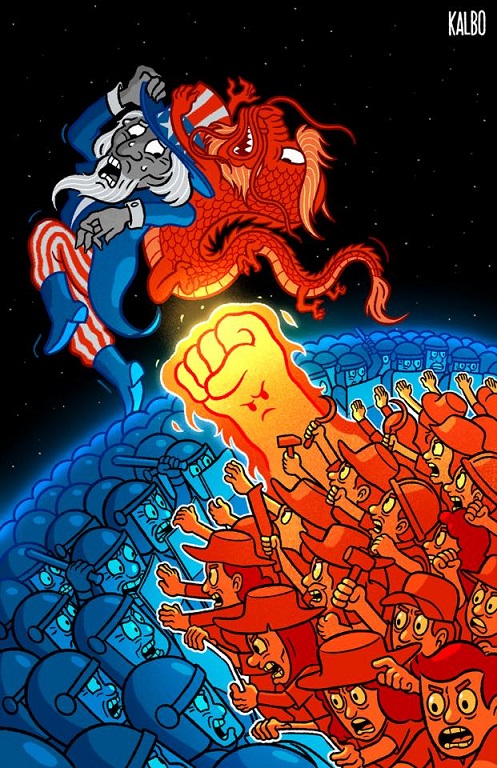
IBON executive director Sonny Africa explains in Filipino the rationale in choosing imperialism as theme: “Christmas is all around us. Imperialism is all around us, too, [but] the anger towards it has abated. People should be reminded that imperialism is still there. IBON is all words, and imperialism should be explained to the public. Not a lot of people would come if we launched words. We thought of the images done by Tarantadong Kalbo whose works are relatable [and] penetrate people’s minds and hearts. For each day of 2025, we must educate people on imperialism.”
Africa continues: “The world has changed. We need to grasp the reality that to reach out to people, we need to grasp what Tarantadong Kalbo has done through his viral images.”
Sticking to IBON’s advocacy of educating the public, the foreword in the planner is an explanation of the deep connection between US-China imperialism and the Philippines: “The US invokes security or stability and China makes historical claims when these are really just about regional control and domination. The US, in particular, isn’t in the Philippines to protect Filipinos — it’s here to use the country against China in its battle for hegemony. US and other foreign investors aren’t in the country to develop the economy— they’re out to profit from Filipino workers and consumers and our wealth of resources.”
Tarantadong Kalbo’s images show the cultural, economic, military, and political control over the Philippines by the US and China.
Behind the scene
“I don’t over-explain. I want people to discern [the drawings],” Tarantadong Kalbo tells his listeners. Still, everyone is made privy to how the illustrations came to fruition.
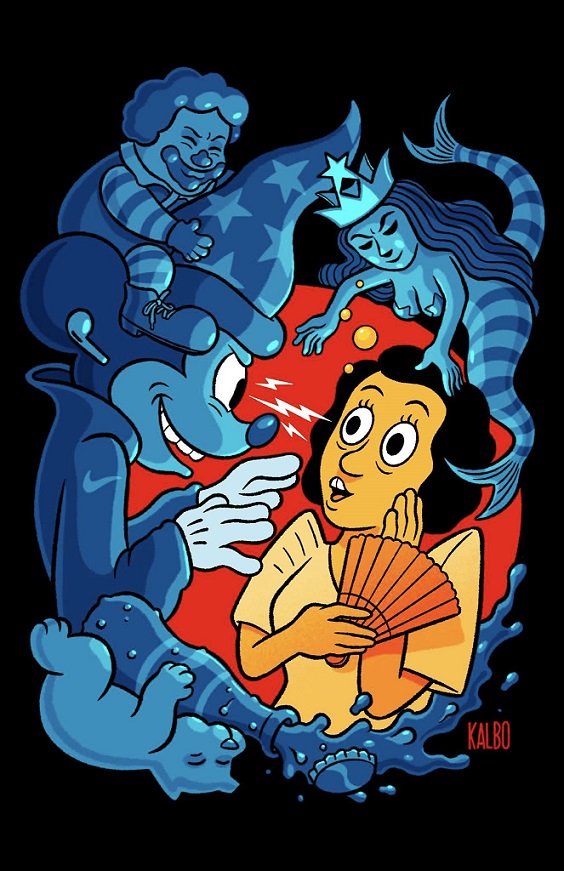
“I got inspiration from the style of the World War II agitprop, i.e., use of three primary colors, to tie it with imperialism,” he points out, as the time-lapse video on the screen shows his uncolored sketches turning red, yellow, blue, or a combination of the three.
For example, he drew the economic domination of the Philippines using Mr. Monopoly Man from the real estate board game Monopoly to demonstrate how the practice of land grabbing has led to Filipino farmers going bankrupt. Mr. Monopoly Man holds the Philippine flag’s sun and star and leaps over the overworked farmers in the seated stance of luksong tinik (“jumping over thorns”), a traditional Filipino game.
To illustrate the cultural hold of the US over Filipinos, he referenced the ubiquitous American brands in the country as well as Disneyland — land of fairytale endings — with a sinister Mickey Mouse, the theme park’s mascot.
Illustrating the people’s anti-imperialist struggle was hard for Tarantadong Kalbo. He wanted to accurately capture and convey the activists’ struggle, such as in facing state forces in full battle gear at protest marches. He says that as a member of SAKA, he was “part of the action” and needed to show how it felt to be part of the rallies. (SAKA is an alliance of artists, cultural workers, and creatives championing food security, land justice, and peasant rights.)
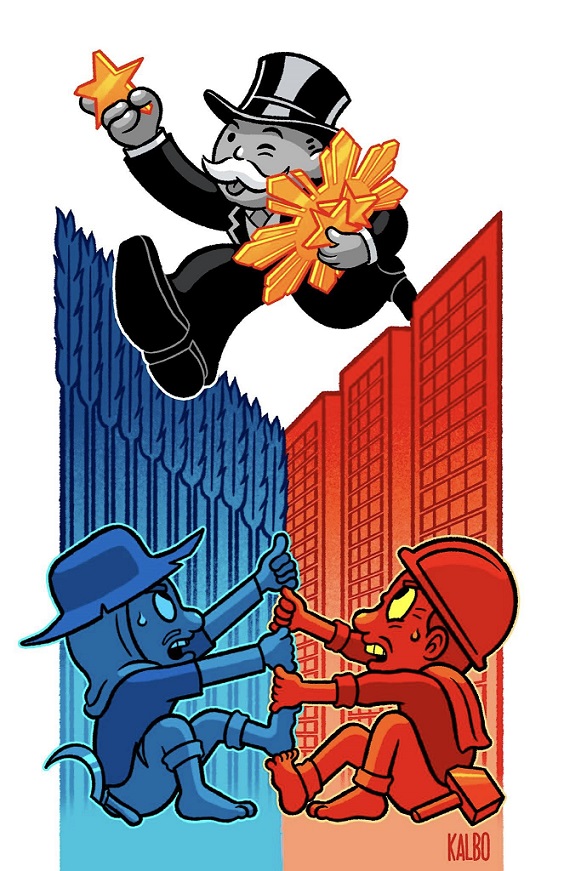
‘Where do we stand?’
Through the 2025 planner, IBON wants to get the message across to disinterested and uninformed Filipinos that US imperialism isn’t the only issue confronting the nation. Chinese imperialism is now part of the discussion because, asserts Africa, “we’re in the midst of the discussion, or ‘war,’ between the superpowers US and China. What we can do is ‘tumindig’ (stand up). As Filipinos, where do we stand?”
Tarantadong Kalbo and Africa share the goal of engaging Filipinos despite the prevailing nonchalance, and it’s not lost on them that breaking the barriers is an uphill task. To fight defeatism, Tarantadong Kalbo falls back on his boldness and satire. Africa remembers the words of the Italian Marxist Antonio Gramsci: “I’m a pessimist because of intelligence, but an optimist because of will.”
“Optimism is a choice,” says Africa. “If there’s a problem, it should be changed.”
The IBON 2025 Planner is available at Shopee and Lazada
